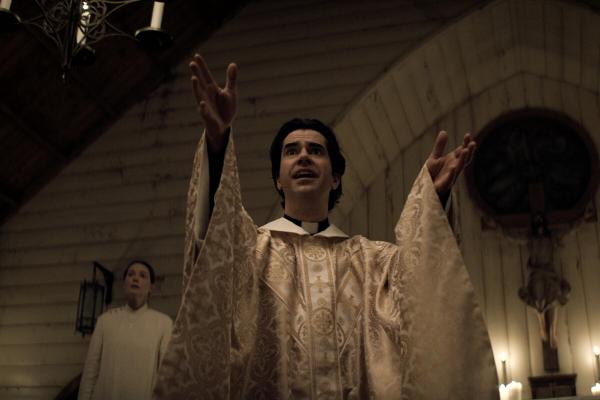The isolated fishing village of Crockett Island, the setting of the new Netflix limited series Midnight Mass, is dying; the kind of long, slow death rattle encompassing everything from the community to the economy to the town’s spiritual life. Those who still call Crockett Island home are mainly drunk, depressed, or bored stiff.
They’re certainly not finding comfort at church. St. Patrick’s, the lone Catholic parish, is a rickety institution where the few remaining congregants mainly still attend out of habit. The place is overseen by self-righteous church lady Bev Keane (Samantha Sloyan) and the elderly, mentally fading Monsignor Pruitt, who’s away on a trip to the Holy Land.
Crockett Island, in other words, is desperate for revival. The one it receives will shake everyone’s beliefs about God, humanity, and mortality to their core. The ones who survive, anyway.
Midnight Mass is the latest from horror filmmaker Mike Flanagan (creator of The Haunting of Hill House and The Haunting of Bly Manor), who excels in slow-creeping, character-based horror. It’s also a project through which Flanagan, a former Catholic, processes his feelings about scripture, religion, and the church. As an artistic representation of someone deconstructing their faith, Midnight Mass employs horror tropes to explore the ways religion responds to pain, both in ways that heal and ways that destroy.
We’re introduced to Crockett Island via Riley Flynn (Zach Gilford), who returns to town after four years in jail for killing a teenager while driving drunk. Formerly a devout Catholic, Riley’s guilt about the event has turned him into an atheist, to the dismay of his parents (Kristin Lehman and Henry Thomas). Conflicted, Riley reconnects with his divorced, pregnant high school sweetheart Erin (Kate Siegel), who’s also returned to Crockett Island.
Riley, Erin, and the other townsfolk are transfixed by the arrival of Father Paul (Hamish Linklater), a younger priest substituting for the absent Monsignor Pruitt, who Father Paul claims fell ill during his trip. Father Paul quickly starts revitalizing the community and performing miracles. A paralyzed girl (Annarah Cymone) can walk again. An elderly parishioner’s (Alex Essoe) dementia reverses itself. But there’s more to Father Paul’s abilities than anyone knows. The true source of his “gifts” carries deadly consequences.
The reactions to Father Paul’s miracles, and the long-simmering conflicts they stir, present several perspectives on faith, forgiveness, repentance, and existence. Muslim Sheriff Hassan (Rahul Kohli) bristles as Bev Keane aggressively tries to convert his teenage son (Rahul Abburi), and is torn between maintaining his identity and earning the town’s trust. The religious Erin leans on an evolving understanding of heaven to withstand a series of tragedies. Riley struggles to believe he deserves the forgiveness he desperately needs.
As writer and director, Flanagan doesn’t judge any of these approaches, giving each character a platform to air their differing philosophies. They echo common discussions about belief and the problem of how an all-powerful God could allow suffering. The series is particularly drawn to Erin, who expresses her unwavering hope in loving, vivid terms, particularly in a heartbreaking speech in which she describes the afterlife as a place where you’re “surrounded by love and no longer alone.”
Even the shady Father Paul communicates some honest, resonant theological truths before revealing his true motives. At a parish-sponsored Alcoholics Anonymous meeting, Riley communicates the issue that led him away from church: the concept that suffering can be a gift from God. Father Paul responds, “I believe God can take our work, even our awful works, and turn them into something else.” It’s a good and earnest insight, but it also foreshadows the awfulness Father Paul is capable of in the name of deluded righteousness.
Spoilers follow
The “big reveal” of Midnight Mass won’t surprise anyone familiar with horror: Father Paul is, in fact, Monsignor Pruitt, turned by a vampire on his trip to the Holy Land. Believing the restoration of his youth to be a divine gift, and the creature that turned him to be an angel, Father Paul returns to Crockett Island literally a new man. He brings the vampire back with him in the hope it will “heal” the rest of his congregation. The result is a take on conversion that spreads like a virus. Father Paul is misguided, but believes he’s doing the right thing. Bev, however, immediately sees an opportunity to wield self-righteous power.
Flanagan uses Father Paul and Bev’s willful misunderstanding of the established rules (or “scriptures”) of horror as a stand-in for the ways Christians often misinterpret or decontextualize parts of scripture to fit their own narrative. The showrunner’s chief concern is showing the extent of the damage Bev, Father Paul, and many real-life people like them, are capable of.
Ultimately, Midnight Mass pits the fearful, manipulated majority of Crockett Island against a courageous few, led by Erin and Sheriff Hassan, in a final battle echoing Revelation’s war in heaven. The outcome here, however, isn’t a very hopeful one, with the island and nearly everyone on it reduced to a smoking ruin.
Flanagan’s grim view focuses on extremist religious fervor over the actual grace of God. His most overtly devout Christian characters are the ones who do the most harm, especially to people on the outside who desperately need a message of unconditional love. In that sense, Midnight Mass offers an effective indictment of humanity’s capacity for evil, as well as the current public perception of the church. Faith itself comes from a good place. However, it’s often misconstrued and used toward selfish, destructive ends. In Flanagan’s eyes, if we want to return to a Christianity that embraces redemption, love, and justice, the only answer may be to burn it all down and start again.
Got something to say about what you're reading? We value your feedback!







